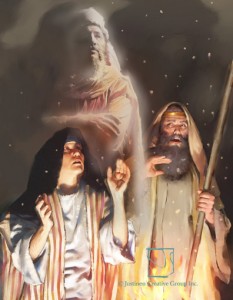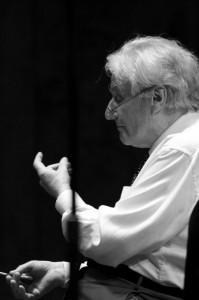
- The Witch of Endor, the Ghost of Samuel and King Saul
People who know me know I’ve been kicking around the idea to write a novel based on the life of King Saul, my favorite Old Testament character.
A little love for King Saul, if you don’t mind. Remember: Here’s a guy who didn’t want the job as King of Israel. He spent his entire reign hounded by that weasel Samuel. He never personally profited from his position. He unified 12 feudin’, fussin’ tribes into a nation. He was heroic in battle.
And he was a good dad.
Really.
Today, King David gets all of the good press. By if you line them up side by side, David’s sins dwarf Saul’s. (And Saul always genuinely repented.)
And there’s the business of the children. But more on that later …
When Samuel publicly announced to the Hebrew people that Saul had been chosen as their first king, they found hiding behind the luggage (1 Samuel 10:22). Afterwards, instead of demanding a lavish new tent or mansion, he simply went home.
When the evil Nahash the Ammonite besieged the Hebrew people, messengers found their new king quietly farming with his oxen. (1 Samuel 11:5)
Saul declined to mercilessly slaughter his defeated enemies. And when he triumphed in battle, he always shared the spoils with his people. Thus by example, King Saul slowly built a stable nation.
Throughout it all, Saul remained modest and obedient, eschewing the trappings of wealth and power, always trying – despite his many failures – to do what’s right.
Which brings us back to the dad business.
We don’t know much about Mrs. Saul. But we know a lot about Saul’s son, Jonathan. Beautiful, loyal, courageous Jonathan. He’s one of the few characters in the entire O.T. who gets a free ride from the chroniclers. He’s always shown in a positive light. And we know David loved him.
Saul, apparently alone among his kingly successors, managed to keep a good balance between work and family. When he was king, he was king. When he wasn’t protecting the entire nation of Israel against hordes of iron-wielding Philistines, he was back home farming and spending quality time with the kids.
Jonathan doubtless noticed.
We can guess from Jonathan’s life that Saul tried to provide a good example, as best he knew how.
Even during Saul’s darkest days, when faced both with David’s rebellion and the external threats from a dozen powerful neighboring kingdom states, he behaved with moderation and restraint.
God eventually chose David and so Saul’s reign came to a bloody end. But even then, Saul’s innate nobility and decency shone through. In the time of his country’s greatest trial, he consulted the Witch of Endor, desperately seeking advice on how to save his people. Not for his own benefit, mind you. He risked damnation to help his people. But even from beyond the grave, Samuel chose instead to taunt and humiliate him. (1 Samuel 28: 1-19).
Some people need to just get over themselves.
In the end, a massive force of Philistines overwhelmed the loyal soldiers who remained. On that awful day, King Saul stood virtually alone on Mount Gilboa with his sons Jonathan, Abinadab and Malchishu. He could have taken his sons and have fled with the royal treasury. And his sons could have slipped away the night before.
But they didn’t. They remained steadfast and shared their father’s fate.
There is more to the story, no doubt, more to Saul we just don’t know:
The Bible says that Saul died because he was unfaithful to the LORD; he did not keep the word of the LORD and even consulted a medium for guidance, 14 and did not inquire of the LORD. So the LORD put him to death and turned the kingdom over to David son of Jesse. (1 Chron 10:13-14)
Um, doesn’t that seem a little extreme?
Think what you will of King Saul, but he must have been a worthy, loving father for those closest to him to remain faithful unto death. How many kings of Israel will be able to say that in the centuries to come?
And in that, if nothing else he is an example to us today: There is no difference between your life at work and your family life. You can’t be ruthless, corrupt, and dictatorial at the office and yet be gentle and loving at home and expect your friends and family not to be impacted by your example. You are called by God to be equally responsible in both.
There is no separation between the two.
There was no separation during the time of King Saul and there isn’t any such separation now.
It simply can’t be done.


 I was fascinated by Dr. Brenda Gourley’s talk ,”Dancing With History: A Cautionary Tale.” A number of her statements struck me, including her claim that it was academics who “most fiercely” resisted the changes suggested by the creation of an Open University. I don’t come from an academic background (as some of my “colleagues” in my previous department frequently reminded me. So when I did arrive in academia, I was pretty naive. I thought academics would be different than the comparable folks I knew in the military or business or politics. I thought that there would be this utopian, unified vision of helping humanity, mentoring students, working together. And, as a not-particularly-promising lad at Baylor in the early ’70s, that’s what I (thought) I saw taking place.
I was fascinated by Dr. Brenda Gourley’s talk ,”Dancing With History: A Cautionary Tale.” A number of her statements struck me, including her claim that it was academics who “most fiercely” resisted the changes suggested by the creation of an Open University. I don’t come from an academic background (as some of my “colleagues” in my previous department frequently reminded me. So when I did arrive in academia, I was pretty naive. I thought academics would be different than the comparable folks I knew in the military or business or politics. I thought that there would be this utopian, unified vision of helping humanity, mentoring students, working together. And, as a not-particularly-promising lad at Baylor in the early ’70s, that’s what I (thought) I saw taking place.